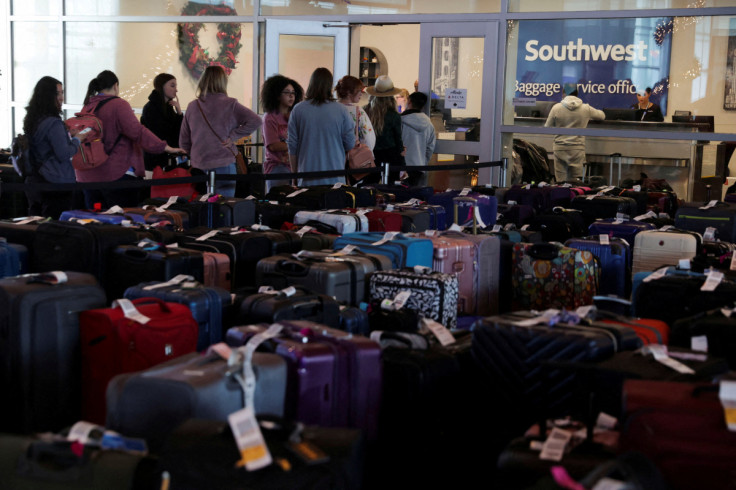Southwest Has No Solutions For Recent Debacle, Faces Up To $1 Billion Revenue Hit

Southwest Airlines has yet to work out how to avoid a meltdown like the one it had last week with the cancellation of nearly 16,000 flights and faces a revenue hit of up to $1 billion, a top pilots union official said.
"They don't know what it is that they're going do in terms of corrective action because they haven't sat down and run the post-mortem on it," Tom Nekouei, a vice president at the Southwest Airlines Pilots Association, told Reuters.
Nekouei said he and other union leaders had a conference call with the Dallas-based carrier's Chief Executive Bob Jordan on Monday to discuss the issue. On the call, details of which have not been reported before, Nekouei said the company offered no immediate solutions.
The pilots union, which is in heated contract negotiations with Southwest, on Dec. 31 published a letter signed by Nekouei, denouncing company leadership as a "cult" that has spent the last 15 years destroying the airline's legacy. Before the recent crisis, Southwest had cultivated a reputation for reliable customer service, humorous flight crews and low-cost flights.
Southwest canceled the flights in the week ended Dec. 29 due to bad weather and meltdown of its crew scheduling system, leaving thousands of passengers stranded.
Southwest, which has said it is making "solid progress" to return operations to normal, had no immediate comment on Thursday.
The unions have blamed the company's "outdated" technology and processes for the biggest operational meltdown in its five-decade history that left many upset customers stranded during the holiday travel season.
The White House has said Southwest "failed its customers" and the government would seek to fine the low-cost airline if it doesn't properly reimburse people for their losses. The company, which was sued for not providing refunds to stranded passengers, previously sent an email apology to affected customers.
Southwest has not said how much it has paid or how many refunds it has processed, but has said it is awarding customers 25,000 Rapid Rewards points it values at more than $300 as a goodwill gesture.
Nekouei said the union's calculations suggest the latest debacle could result in an up to $1 billion revenue hit for the carrier. Some analysts have estimated the meltdown could shave as much as 9% off Southwest's fourth-quarter profits.
The challenge of moving crews around, keeping the airline running, could not be met by Southwest's regular operations and tools, Jordan previously said.
Nekouei said the company's failure to revamp its dated scheduling system that sends crews around the country as passengers for their flying assignments left it vulnerable to "more frequent and more severe" meltdowns. The pilots union has called that so-called "deadheading" practice fatiguing and inefficient.
Nekouei said Southwest is still waiting to request proposals from vendors for new software systems.
A Southwest spokesperson said the company is working on improvements to processes and systems that would bolster its ability to recover "effectively" in large-scale operational disruptions. However, a person familiar with the matter, who asked not to be identified, said the airline has yet to finalize the timeline or the amount it will invest in its revamp.
Nekouei said the same issues led to a major meltdown at Southwest after a thunderstorm in Florida in October 2021 that cost it $75 million.
To be sure, the airline has been upgrading its technology in phases.
In 2017, it replaced its entire reservations system, and four years later it enhanced technology at its maintenance department. Recently, it has made investments in digital scanners to make its baggage handling system more efficient.
But union officials said the pace of investment has been too slow.
"Every meltdown that we've had, it's gotten more severe," Nekouei said. "It's become more frequent now and it takes longer and longer to recover from them."
© Copyright Thomson Reuters 2024. All rights reserved.




















